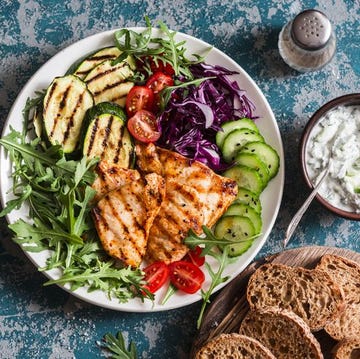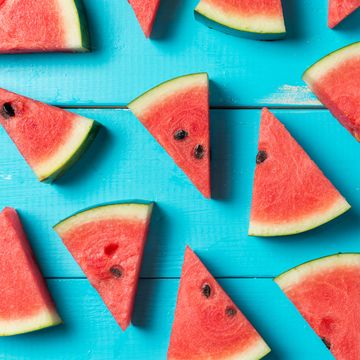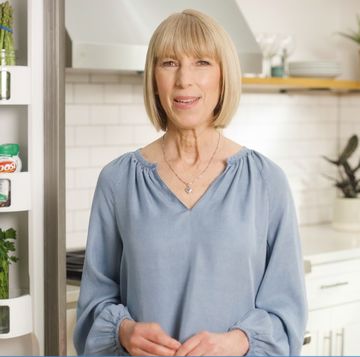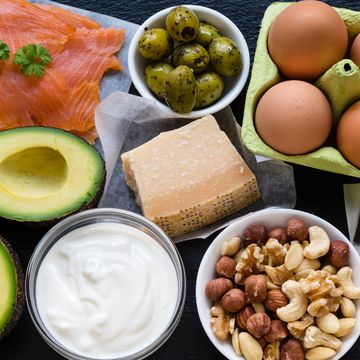Dieting has, for better or worse, been a prevalent part of American culture. From fad diets to supplements to workout regimens to everything in between, the U.S. weight loss market is worth an astounding $72 billion. The keto diet, an eating plan that involves eating high amounts of fats, moderate amounts of protein, and very low amounts of carbohydrates, is one such diet that has gained mainstream popularity in recent years, mostly for its purported weight-loss benefits. A number of high-profile celebrities, for example, have gushed about the keto diet, including Kim Kardashian-West, Halle Berry, Gwyneth Paltrow, and Labron James.
“[The Keto diet] was originally developed for infants and children with severe epilepsy, but today it’s popular for its rapid, but not always sustainable, weight loss results,” Rachel Pacala, MS, RDN, CNSC, tells Woman's Day.
If you're looking for ways to lose weight, or perhaps just a new and alternative way to eat, the keto diet might be helpful. But before you jump on the keto bandwagon, you should know exactly what it is, how it differs from other popular diet, what experts have to say about the possible health effects, and the proper and safe ways to get started. And of course, as with any time you consider starting a diet or changing your diet significantly, you should consult a medical professional and/or your family physician before starting the keto diet, to make sure it is in fact the diet that will work best for you and your body.
What is the Keto diet?
Unlike other low-carbohydrate diets — like the Atkins diet, which exclusively focus on cutting carbs — the keto diet emphasizes the body entering a state of ketosis. Ketosis occurs when your body doesn’t have enough carbohydrates to use as energy, and instead relies on burning fat for energy.
“Ketosis, when done properly, changes the body’s main energy source from using carbohydrates to fat, which helps to use the body’s stores and revs up weight loss. However, followed incorrectly, the keto diet has the potential to set you on a diet rollercoaster ride, negatively affecting your hormones and metabolism, while increasing inflammation,” Allison Thibault, MS, RDN, LDN, CDN, lead clinical dietitian nutritionist for one of the biggest hospital systems in the country, and founder of VivaTotalHealth, tells Woman's Day.
Who can benefit from the keto diet?
“The people benefitting the most from the keto diet are individuals who are pre-diabetic or diabetic, due to the fact that it improves both their hemoglobin A1C levels and insulin sensitivity,” Pacala explains. However, she notes that going keto isn’t suitable for everyone.
“Anyone with a history of cardiovascular disease should avoid it since there’s controversial research regarding the keto diet causing LDL cholesterol levels to increase. Pregnant women and anyone with a history of eating disorders or an unhealthy relationship with food should also stay away from a restrictive diet fad like this.” Restricting full food groups, such as carbs on the keto diet, can possibly be triggering for some, and lead to unhealthy and disordered eating habits.
The pros of the keto diet.
Thibault notes that the pros of the diet, including the ability to jump start weight loss, reduce appetite, and promote less cravings. It can also help to regulate your blood sugar, Thibault says. "You don't get the highs and lows in your blood sugar levels that carbs and sugars can induce."
The diet may also help lower blood pressure and inflammation levels in some people, "but only if you're avoiding processed and fast foods and following the diet in an intentional way by eating whole, unprocessed foods," Thibault adds.
The cons of the keto diet.
As with any diet, there are also negative consequences of the keto diet. If performed incorrectly, Thibault says, it may have the potential to alter hormones, leading to hormonal dysfunction, which stresses you and your body out. The diet is also incredibly restrictive, which can impact your quality of live and cause food anxiety and/or disordered eating. Lastly, it can lead to nutritional deficiencies and constipation due to restricted consumption of vegetables, fruits and whole grains, as well as other nutrient dense foods.
The steps to follow when starting Keto.
There are three steps you should take when starting the Keto diet. The first, is to find an RN or doctor to work with. “People under supervision of a registered dietitian or a doctor will benefit the most," Pacala says. "Otherwise, I feel like it will be hard for most people to know if they’re actually in ketosis or not. You might be eating too many carbs or too much protein. And if you’re trying to follow a keto diet but you’re not in ketosis, then you’re basically just eating a lot of fat without getting that fasting state benefit."
Pacala also adds that it's vital to meet with someone "who can help you determine the percentages of fat, protein, and carbs you need to be successful” in the diet.
The next step is to buy the correct foods. Good keto foods to eat include “eggs, fatty fish (salmon, tuna, mackerel), nuts and seeds, avocado, and lower carb vegetables like zucchini, cucumbers, asparagus, and leafy greens” Thibault says.
You shouldn't use the keto diet as a reason to eat food that’s bad for you, though. “Some people just eat a bunch of bacon, butter, and fat. Or try doing keto by eating lunch meats all day, which are high in sodium, nitrates, and nitrites," Pacala says. "I wouldn’t call that cardio protective or healthy. You need to be educated on the types of fats and foods that are beneficial to your health."
The last step is to keep your loved ones informed, including your friends and family members, on your new eating plan, so they can find ways to be supportive. "Sit down together and list foods everyone agrees upon that follow the keto diet, and find a way to incorporate those foods into meals," Thibault says. "That way, you won’t feel left out and everyone can enjoy the meal and eat at the same time. Individuals with interest in adding more carbs to their dishes will be able to."
How you can tell that the keto diet may not be right for you.
You’ll know the keto diet is working for you if it’s making you feel great and yielding beneficial health results (i.e. your lipids are improving and your skin is clear). However, you should also watch out for signs that it isn’t a good fit.
“You know it isn’t working for you if you’re not feeling good and you’re not enjoying it. If it’s taking you away from enjoying your life and seeing your family and friends, you should reevaluate," Thibault says. "Life is all about experiences, and if your eating plan is causing you to miss out on a lot, increasing stress, and not helping you to improve the quality of your health and life, then you should ask yourself if it’s worth it and possibly follow a different path. Consult with a registered dietitian to help you find the best way to safely, effectively, and sustainably reach your nutrition and health goals."
Subscribe to Woman's Day today and get 73% off your first 12 issues. And while you’re at it, sign up for our FREE newsletter for even more of the Woman's Day content you want.












